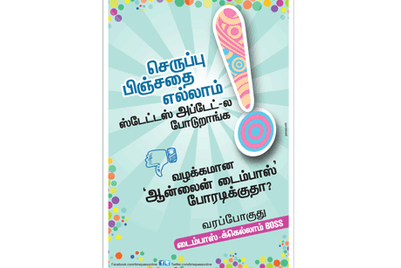
Motor Vikatan, the first Tamil automobile magazine, published by the Vikatan Group, will complete seven years in the market in January 2013. Promoting the seventh anniversary issue will be a campaign on print and online media. Chennai-based creative shop OPN has been entrusted with the job. Excerpts from a chat with the magazine’s editor, P Arokiavel:
What is the current print run of Motor Vikatan?
We sell more than 75,000 copies every month and I’m sure no English auto magazine sells as many copies in Tamil Nadu. To be more precise, the sum total of Motor Vikatan’s sales is more than the sum total of all auto magazines that sell in Tamil Nadu. I don’t deny the fact that some of my English counterparts are big - but in Tamil Nadu, Motor Vikatan is big.
What has been the USP of Motor Vikatan since its launch in January 2007?
There was a vacuum and through Motor Vikatan we wanted to fill that vacuum. Having said that we also wanted to tell the story of automobiles and cars in a language that people can understand. We talk in a language that people can comprehend and understand. That has been our USP. We call a steering, a steering. We just borrow English words. It’s not a Tamil-oriented magazine. This is a magazine for automobile enthusiasts who read, write and speak Tamil. That is how we have positioned our magazine and it gels well with the readers.
How different is the content of Motor Vikatan compared to some English magazine in the same space?
I would say Motor Vikatan is a mix of What Car and Auto Car. In What Car, people perspective will find more relevance and more pages. Similarly, in Motor Vikatan, we have more representation or I would say more What Car-like articles. Almost 30 to 40 percent of the content is contributed by the readers in an issue. Besides, we have a content sharing agreement with Auto Car India. A fifth of our magazine’s content is sourced from Auto Car India.
What are your plans for the seventh anniversary?
Seven is a magic number and it has got much significance. Aston Martin is also celebrating 50th anniversary this year and number seven is also associated with Aston Martin in a way, through 007, James Bond. We are doing a story about Aston Martin, seven super cars, seven super bikes, seven new launches. So, everything would revolve around No. 7.
What are the challenges you have been facing when it comes to marketing a Tamil auto magazine?
We never faced any challenge from readers. Month after month, our magazines fly off the shelves. The only challenge that we have been facing is from the marketing people. It’s very difficult to market the magazine to marketing managers who have this pre-conceived notion Tamil magazines are ‘grade B’ while English magazines are ‘grade A’.
Motor Vikatan is self sustaining because of its strong sales figure. Motor Vikatan is priced at Rs 40; it is the highest priced Tamil magazine within the Group or even outside. Even if we up the price, I don’t think there will be any resistance or drop in the sales figure.


.jpg&h=334&w=500&q=100&v=20250320&c=1)
.jpg&h=334&w=500&q=100&v=20250320&c=1)



.jpg&h=334&w=500&q=100&v=20250320&c=1)
.jpg&h=334&w=500&q=100&v=20250320&c=1)







.jpg&h=268&w=401&q=100&v=20250320&c=1)
.jpg&h=268&w=401&q=100&v=20250320&c=1)

.jpg&h=268&w=401&q=100&v=20250320&c=1)
